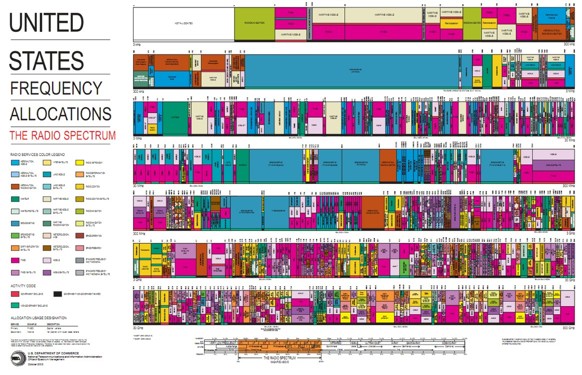Presidential panel urges more flexible use of spectrum
June 1, 2012 | Source: New York Times
A just-completed report from a presidential advisory committee urges President Obama to issue an executive order to adopt new “cognitive” or “agile” radio technologies to make better use of a huge swath of the radio spectrum now controlled by federal agencies.
The plan calls for electronically sharing spectrum for short periods of time using newly available computerized radio technologies,
The shift would relieve spectrum congestion caused by the popularity of smartphones, and generate far more revenue for the federal government than auctioning spectrum to wireless carriers, according to the authors of the report.
Making better use of the spectrum for cellphones would allow for more services, more competition and possibly lower prices for consumers using cellphone data services.
The authors cite a recent European study that found that freeing 400 megahertz of radio spectrum to be shared using new technologies would be equivalent to an economic financial stimulus of 800 billion euros.
According to Mr. Gorenberg, who presented the report on Friday before the committee, the amount of wireless data that has been transmitted by the growing legions of smartphones and wirelessly connected tablets has doubled every year for the last four years. He said that there would be as many as 50 billion devices transmitting and receiving wireless data by 2020, leading many in the wireless industry to forecast a spectrum crisis.
The report concludes that the radio spectrum could be used as much as 40,000 times as efficiently as it is currently and the committee recommends an approach that could increase capacity 1,000 fold. Computer-controlled radios inside a cellphone could rapidly switch the frequencies they broadcast and receive on based on an arbitrary set of rules.
The report, which is titled “Realizing the Full Potential of Government-Held Spectrum to Spur Economic Growth,” by the President’s Council of Advisors on Science and Technology (PCAST) calls for a tiered system in which different users would have different priority, possibly based on whether they were a government user, a user who was prepared to pay more for a higher quality-of-service,” or a casual user who might be assigned the lowest priority and pay the lowest rate.
The newly available spectrum would require devices “register” in a database that would then control the terms of their access to the spectrum.
The report also calls on the president to create a “synthetic” currency that could be used to entice federal agencies into offering more spectrum to the system. The proposed system would in effect increase an agency’s budget if it was willing to give up, or share its spectrum.
He warned that if the United States failed competitively, the nation would likely see a repeat of the situation in the early 1990s when advanced digital cellular standards were created first in Europe.
Also see: Q.&A.: Martin Cooper, Father of the Cellphone, on Spectrum Sharing
